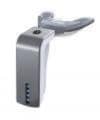by Christopher Piehler

Our country is in the midst of a once-in-a-lifetime period of economic change. Over the past year or so, Americans have been jolted and jarred by a roller coaster of unprecedented turmoil in the housing and financial markets. Hundreds of thousands of people have lost their jobs, entire companies have disappeared, and consumer confidence has taken a nosedive.
This rough ride has taught us that some so-called economic certainties—home prices always go up, people always pay their mortgages, certain companies are too big to fail—are not always so certain. As we enter the last year of another decade, change is more than a political buzzword. It is everywhere.
In scientific circles, of course, change is often represented by a ?. So the question now, for the country and for the orthodontic profession, is, “How do we navigate the delta?”
Orthodontists I have talked to are taking the full spectrum of approaches. Some anticipate downsizing their practices and are doing the cruel calculus of which employees they can do without. Others are now planning to work a few more years rather than retire as they had planned. Still others are looking to expand the scope of their practices by offering new treatment options or services. The most aggressive are taking advantage of devalued real estate to buy new locations and increase their earning potential.
In times of strife, different people take different approaches, but one thing we all share is the primal fear of losing the homes, businesses, or nest eggs we have worked so hard to accumulate.
|
To send a comment or suggestion to the editor, click on the “contact” link at the top of the page. |
In a recent poll on our Web site, I asked what orthodontists saw as the biggest threat to their practices: other orthodontists, GPs doing orthodontics, or patients’ inability to pay due to the rough economy. Six percent of respondents said “other orthodontists,” 29% were most concerned about GPs, and a whopping 65% said their biggest threat came from the economy. Clearly, orthodontists are feeling the pinch along with their patients. So here’s a thought: Though it may not bring more patients into the chairs, it is somehow comforting to know that we are all in this together.
Christopher Piehler
/p>








